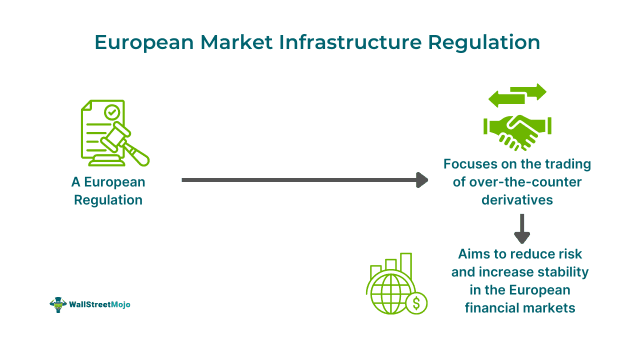Table of Contents
What Is European Market Infrastructure Regulation (EMIR)?
The European Market Infrastructure Regulation (EMIR) is a European Union (EU) Regulation that concerns the trading of over-the-counter (OTC) derivative contracts. This regulation, which was initially introduced in 2012, aims to lower risks and enhance the stability of the financial markets in the EU.

This framework includes a requirement for reporting all derivative contracts to trade repositories, which is a central clearing responsibility for applicable OTC derivatives. It also involves strategies for minimizing the risk of counterparty credit and risks associated with operations for bilaterally cleared OTC derivatives. Furthermore, it comprises standard regulations for central counterparties (CCPs) and trade repositories.
Key Takeaways
- The European Market Infrastructure Regulation (EMIR) is an EU rule that instructs companies that engage in financial derivative contracts to report specific details through a Trade Repository.
- This regulation was first introduced in 2012. It strives to increase stability while decreasing risks involved in the EU's financial markets.
- The EMIR applies to any organization located in the United Kingdom or the European Union that starts, changes, and ends a derivative transaction.
- The primary requirement of EMIR reporting is that all entities submit all of their derivative transactions to the relevant trade repository on a T+1 basis.
European Market Infrastructure Regulation Explained
The European Market Infrastructure Regulation (EMIR) is an EU Regulation that directs organizations trading in financial derivative contracts to submit detailed information through a Trade Repository. The EMIR mandates any entity that trades derivative contracts to provide a report on each aspect of every transaction. Financial regulators utilize the information gathered from reports filed with trade repositories to identify any significant concern in the financial market.
This essential regulatory framework was implemented following the 2007-2008 financial crisis to increase market openness and aid in risk prevention. The EMIR applies to all financial and non-financial counterparties that engage in derivatives contracts. The goal of this system is to improve the European Union's regulatory framework for derivatives trading by enhancing market stability, transparency, and effectiveness.
Who Is Affected?
Any entity based in the European Union or the United Kingdom that initiates, alters, or concludes a derivative trade is subject to the EMIR. When trading with an EU firm, counterparties from outside the EU may also experience indirect impacts. According to the Regulation, counterparties to a derivatives contract might be of two primary types:
- Financial counterparties, such as banks, investment companies, insurance companies, and fund administrators.
- Non-financial counterparties, such as any institution that does not offer financial services.
Any company that trades derivative contracts might have to provide reports in accordance with EMIR. For every trade, both counterparties, that is, the purchaser and the seller, usually have to file a report. This rule has specific exemptions, such as when:
- The parties have decided that one will report on behalf of both.
- One or both counterparties have assigned a third party to handle their reporting requirements.
- A financial counterparty and a non-financial counterparty engage in a trade.
EMIR Reporting Requirements
The most urgent and significant requirement of EMIR reporting is that all businesses disclose their derivative trades to their respective trade repository on a T+1 basis. Although third parties can fulfill EMIR reporting requirements on behalf of a company, some enterprises continue to find it challenging to comply due to the lack of easily accessible solutions in the financial markets. Additionally, EMIR introduces more regulations for the risk management of trading and clearing derivatives. It includes the requirement to employ central counterparties (CCPs) to clear certain OTC derivative transactions. Any companies that meet certain levels within each asset type are subject to these reporting requirements.
EMIR Reporting Obligation
The EMIR reporting obligations include the following:
- Counterparties have the option to track and report on their derivative activities and directly submit them to a trade repository. Businesses that opt for this method are usually required to create strong internal controls and processes to make sure they continue to adhere to all applicable EMIR requirements.
- The counterparties may agree to allow one to report on behalf of one of the parties. This is known as delegation of reporting.
- EMIR permits businesses to delegate reporting responsibilities to a third-party reporting service provider. This method ensures constantly compliant transaction reporting while saving money and internal resources.
What To Report And To Whom?
All derivative operations, which include those that are transacted on an exchange, are required by EMIR to be disclosed to an authorized trading repository. As per EMIR, every entity that engages in derivative contracts needs to file reports describing every over-the-counter transaction to the applicable trading repositories. These essential documents must also contain a legal entity identifier (LEI) and a Unique Transaction Identifier (UTI). They must also include details about the counterparty's trading capability and the position's marked-to-market valuation.
Penalties For EMIR Reporting Violations
According to Article 12 of EMIR, member nations may impose fines for violations of the reporting requirements. Each nation's national competent authority (NCA) is in charge of implementing these penalties. The Financial Conduct Authority (FCA), which is the NCA in the UK, has extensive authority to issue penalties without any upper limit on the penalty.
What Is EMIR REFIT?
The European Commission's Regulatory Fitness and Performance Programme (REFIT) is known as EMIR REFIT. This framework is frequently employed to evaluate European legislation and discover areas for development. Following the start of the EMIR review procedure in 2015, the Regulation (EU) 2019/834, commonly referred to as EMIR II or the REFIT Regulation, was passed.
The majority of the new regulation's terms came into effect on June 17, 2019, and they placed reporting obligations on a more significant number of counterparties, such as Central Securities Depositories and Alternative Investment Funds (AIFs). In addition, the REFIT Regulation established additional Fair, Reasonable, Non-Discriminatory, and Transparent (FRANDT) criteria and defined the status of minor financial entities.
